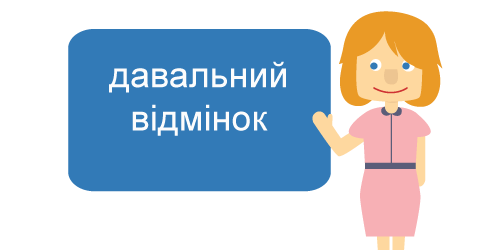
Ukrainian cases
Ukrainian lessons for beginners
Lesson 7: Давальний відмінок – Частина 2: Прикметники.
Dative – Part 2: Adjectives
Part 2 – The dative case of adjectives
!!! This course requires basic knowledge of Ukrainian. If this is not your case, we recommend you our Basic Ukrainian Course!!!
We will learn how to express well the adjectives in dative and will finish with this case for beginners.

Introduction to the dative case
When is the dative case used?
Generally, we use the dative case…
- to express the indirect object:
- to express someone’s age:
- to say “I like, he likes, etc.” using the verb “подобається”:
- to express someone’s mood:
| Я даю книгу моєму брату |
I give my brother a book |
| Мені 30 років. Моєму брату 28 років | I am 30 (years old). My brother is 28 (years old) |
| Мені подобається фільм |
I like the movie |
| Мені добре / моїй подрузі погано | I feel fine / My friend is feeling bad |
What will we learn in this lesson?
We are going to learn the dative case of different adjectives and pronouns.

Ukrainian vocabulary
Read, listen and repeat the basic vocabulary of this lesson.
If you still don’t know how to read the Cyrillic alphabet, visit our course on how to read Ukrainian.
риба
fish
м’ясо
meat
скинути вагу / худнути (схутнути)
to lose weight
жарений
fried
смачний
yummy, delicious
корисний
healthy
картопля
potato
фінал конкурсу
finals (of a contest)
переможець
winner
спортивний
athletic, sporty
учасник
competitor, participant
молодший
youngest, junior, little
родич
relative
вишиванка
vyshyvanka (traditional Ukrainian shirt)

Dialogues
Read, listen and pay attention to the cases used
Extra help: highlighted cases + tables
We have highlighted the words in dative. You can also look up these grammar tables while you read the dialogues:
These tables will open in a new window.
Dialogue 1
Що ти зазвичай готуєш на вечерю?
What do you usually cook for dinner?
Хм….Я часто готую рибу. Моєму старшому сину подобається риба.
Hmmm… I often cook fish. My older son likes fish.
А що ти даєш своїй маленькій доньці?
And what do you give to your little daughter?
Я їй даю молоко та фрукти. Також, я часто готую суп. Моїй старенькій бабусі потрібно їсти суп.
I give her milk and fruit. Also, I often cook soup. My old grandmother needs to eat soup.
А твоєму чоловікові? Йому теж подобається суп?
And your husband? Does he also like soup?
Моєму товстому чоловіку потрібно скинути вагу. Ось чому готую йому салати.
My fat husband needs to lose weight. That’s why I prepare him salads.
А він не сумує за жареним м’ясом та жареною картоплею?
And he doesn’t miss fried meat and fried potatoes?
Мені здається, що він вже звик до смачної та корисної їжі.
It seems to me that he already got used to delicious and healthy food.
Dialogue 2
Завтра фінал шкільного конкурсу. Що ви подаруєте переможцям?
Tomorrow is the final of the school contest. What will you give to the winners?
Ось приз. Це м’яч. Ми подаруємо його найспортивнішому студенту.
Here are the prizes. That’s a ball. We’ll give it to the most athletic student.
А кому ви подаруєте цю книгу?
And who will you give this book to?
Ми подаруємо цю книгу найрозумнішому студенту.
We are giving it to the smartest student.
А кому ви подаруєте квіти?
Аnd who will you give these flowers to?
Ми подаруємо квіти найкрасивішій студентці.
We’ll give them to the most beautiful student.
А кому ви подаруєте цей годинник?
Аnd who will yougive this watch to?
Ми подаруємо це найкращому вчителю.
We’ll give it to the best teacher.
А ці гарні ручки?
And these nice pens?
Ми подаруємо їх всім учасникам.
We are giving them to all participants.
Dialogue 3
Привіт, Стефані. Як справи? Як Україна?
Hi Stefani. How are you? How’s Ukraine?
Все добре, але я дуже сумую за моїми американськими друзями.
Everything is fine, but I really miss my American friends.
Ти вже звикла до холодної погоди?
Have you already got used to the cold weather?
Так, я вже звикла до погоди, але я не можу звикнути до українських людей. Вони так мало посміхаються…
Yes, I’ve already got used to the cold weather, but I can’t get used to the Ukrainian people. They smile so little…
Можливо їм холодно. Ось чому вони такі серйозні.
Probably they feel cold. That’s why they’re so serious.
Мені теж так здається. Добре, мені потрібно йти. Я хочу купити моїм кращим друзям з Америки подарунки.
That’s what it seems to me, too. Ok, I must go. I want to buy my best (male and female) friends from America presents.
Ти вже готуєшся до зимових канікул? Ти їдеш в Америку на Різдво, чи не так?
Are you already getting ready for winter holidays? You’re going to America for Christmas, right?
Так, я вже купила моїм маленьким братам та сестрам подарунки. Я подарую всім моїм родичам українські вишиванки.
Yes. I’ve already bought my little brothers and sisters presents. I’m giving all my relatives Ukrainian vyshyvankas.
Гадаю, що вони будуть дуже раді твоїм подарункам!
I think they’ll be very happy with your presents!

Ukrainian grammar
Read the following grammar summary. We will learn the cases from this lesson.
The dative Case: Adjetives
In the dialogues we have seen examples of Dative Case (Dat.) in adjectives. Below we will learn more about it.
| Adjective + Noun in singular |
| We have highlighted the endings in the tables for each gender. |
| Adjective + Noun in plural |
| We have highlighted the endings in the tables for each gender. |
Masculine: -ому
- Це мій новий студент (Nom.). This is my new student.
- Я роблю подарунок моєму новому студенту ((Dat.). I give a present to my new student.
Masculine: -ам
- Це мої нові студенти (Nom.). These are my new students.
- Я роблю подарунок моїм новим студентам (Dat.). I give a present to my new students.
Feminine: -ій
- Це моя маленька сестра (Nom.). This is my little sister.
- Я роблю подарунок моїй маленькій сестрі (Dat.). I give a present to my little sister.
Feminine: -им
- Це мої маленькі сестри (Nom.). These are my little sisters.
- Я роблю подарунок моїм маленьким сестрам (Dat.). I give a present to my little sisters.
Neuter: -ому
- Це моє велике поле (Nom.). This is my big field.
- Я роблю подарунок моєму великому полю (Dat.). I give a present to my big field.
Neuter: -им
- Це мої великі поля (Nom.) These are my big fields.
- Я роблю подарунок моїм великим полям (Dat.). I give a present to my big fields.

Test
Check if you know this lesson:



